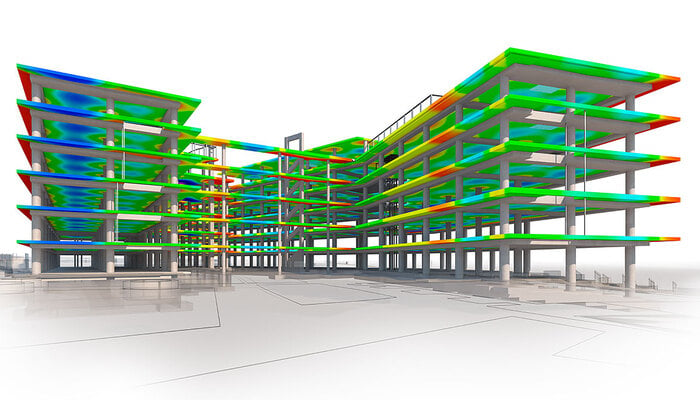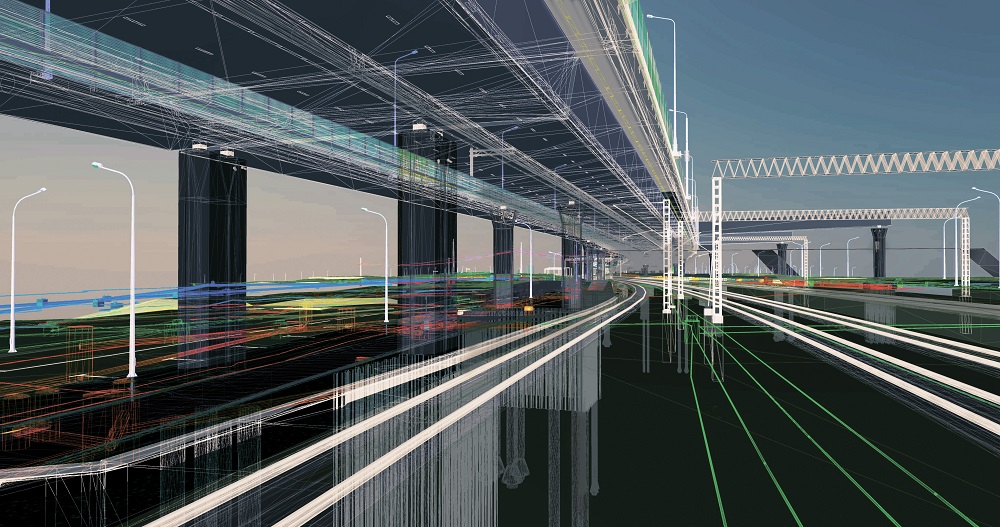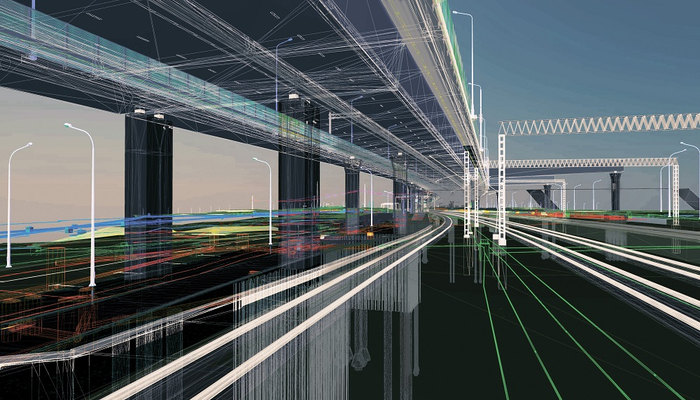Top 5 BIM Course for Civil Engineers in Delhi (2025)

Table of Contents
Civil engineering is to architecture what the brain is to the body. It brings rationality to a design, making it more practical, implementable, and sustainable. For civil engineers to be impeccable at this job, they need to be equipped with the best tools and technologies. This is where new-age processes such as Building Information Modelling (BIM) come into play. It makes evaluating design feasibility, structural analysis, and project management simpler and more accurate. Let’s look better at BIM's role in shaping the future of civil engineering.
BIM for Civil Engineers
BIM is a digital representation of a project's physical and functional characteristics, showcasing everything from the architectural and structural components to the plumbing and electrical systems. Unlike traditional 2D AutoCAD drawings, BIM provides a 3D, data-rich model that integrates geometry, materials, and spatial relationships, offering a holistic view of the project throughout its entire lifecycle. The most widely used and popular BIM software for civil engineers includes Autodesk Civil 3D, Tekla Structures, Revit, InfraWorks, and MicroStation.
How is BIM Beneficial in Civil Engineering
As cities expand, infrastructure becomes more complex, and the demand for sustainable, cost-effective solutions rises. In this regard, civil engineers must stay ahead of the curve. That's where BIM steps in as a game-changer. Let’s have a look at how BIM benefits civil engineers.
1. Enhanced Collaboration and Communication
Civil engineering projects often involve multiple teams, including architects, structural engineers, Mechanical, Electrical, and Plumbing (MEP) experts, contractors, and clients. BIM is a comprehensive platform for professionals to collaborate in real-time, share insights, communicate effectively, and make informed decisions.
2. Improved Design and Analysis
BIM models not only help civil engineers in visualising designs but also allow for detailed analysis and simulations. They can run structural and performance analyses to identify potential issues early in the design phase. This approach leads to optimised designs, cost savings, and more resilient and efficient infrastructure.
3. Cost Savings and Efficiency

BIM enables civil engineers to streamline project workflows. With accurate and detailed models, professionals can create precise cost estimates and construction schedules. This allows better resource allocation, reduced material wastage, and fewer costly delays. This also assists in delivering projects on time and within budget.
4. Environment-Conscious Development
BIM aids in sustainable design by allowing engineers to assess the carbon footprint of their projects. It enables the incorporation of energy-efficient systems, materials, and construction methods, reducing the project's environmental impact.
5. Project Lifecycle Management
BIM models contain information invaluable for facility management and maintenance. Civil engineers can use these models to track changes, monitor equipment performance, and plan for renovations or upgrades, ensuring that infrastructure remains safe and functional throughout its lifecycle.
6. Clash Detection and Conflict Resolution
By identifying issues such as overlapping pipes, structural components, or utility lines, engineers can proactively address and resolve conflicts before construction begins. This leads to smoother construction processes, fewer change orders, reduced rework, and more efficient and cost-effective project delivery.
Read more: 6 Ways BIM Is Proving To Be The Future Of Architecture
Why Should Civil Engineers Learn BIM?

If you are confused about “Can a civil engineer do a BIM course?”, let us tell you that the answer is a resounding- Yes!
With BIM, civil engineers can harness the power of digitalisation to reshape their approach to building design and construction. BIM provides a comprehensive 3D view of projects, enabling engineers to perform detailed analysis and simulations, resulting in more efficient designs and cost-effective solutions. This can be beneficial even for freelance civil engineers who want to streamline their workflow and manage multiple projects.
Additionally, modern-day projects demand a level of precision, efficiency, and sustainability that traditional methods struggle to deliver. With its 3D modelling and data-rich approach, BIM aligns perfectly with these demands. Also, investing in BIM courses can help civil engineers gain skills that are relevant today and future-proof. Civil engineers well-versed in BIM will be better prepared to adapt to new tools and methodologies, ensuring their continued success in the industry.
How Much Does a BIM Course Cost in India?

BIM course fee for civil engineers in India can vary significantly depending on several factors. One of the primary factors influencing the cost is the tenure of the course. Short-term or certification courses that provide a basic understanding of BIM tools and concepts are typically more affordable and may range from INR 10,000 to INR 50,000. Private training institutes, colleges, or online platforms mostly offer these courses.
On the other hand, if you opt for an advanced BIM course for civil engineers, such as diploma or degree programs, which may provide placement opportunities, the cost can be higher. Diploma courses offered by reputed institutions can cost anywhere from INR 1 lakh to INR 3 lakhs. At the same time, bachelor's or master's degree programs with a focus on BIM can range from INR 3 lakhs to INR 10 lakhs or more, depending on the duration and the prestige of the institution.
To select the right BIM course for civil engineers, it’s essential to consider your budget, location, career goals, and the depth of BIM knowledge you require to be successful at your job. For instance, if you want to look for a BIM course in Delhi, you can use the internet to thoroughly research the above-mentioned aspects to identify your right fit. You can also consider scholarships, financial aid options, and EMI plans provided by certain academic platforms or institutes to help alleviate the cost burden for deserving students.
Read more: The Opportunity Cost of Not Adopting BIM in 2023
5 Best BIM Courses in Delhi for Civil Engineers
If you are looking for the best BIM training institute in India or premium platforms that offer a BIM course in Delhi, then we have got you covered. The course curriculums are designed in a fashion that directly helps professionals in their field of work. Let’s look at the 5 best BIM courses for civil engineers in the capital city of India.
1. BIM Professional Course for Civil Engineers by Novatr
Duration: 7 months
Mode of Learning: Online
This BIM course in Delhi, offered by Novatr is a comprehensive program that has been meticulously designed to cater to the specific needs of civil engineers. The course focuses on equipping learners with the knowledge and practical skills required to excel in BIM. It is suitable for both fresh graduates and seasoned professionals. The curriculum encompasses a wide variety of topics that include BIM basics, software training, precast construction, preparation of bill of quantities (BOQs), parametric modelling, annotation, detailing, and schedule.
What sets Novatr's BIM course for civil engineers apart is its emphasis on hands-on training and real-world projects. The curriculum goes beyond theory, encouraging participants to apply what they've learned in practical scenarios. This approach enhances the understanding of BIM concepts and ensures that civil engineers can effectively implement BIM in their projects. Additionally, the course is taught by industry experts and offers placement assistance to all learners.
2. MBA in Digital Transformation and BIM Management by NICMAR

Duration: 2 years
Mode of learning: On-campus
The National Institute of Construction Management and Research (NICMAR) is renowned in construction management. It offers an MBA in Digital Transformation and BIM Management. This postgraduate program on BIM for civil engineers is a unique blend of business management and BIM expertise. It is the ideal choice for professionals looking to take on leadership roles in BIM implementation within the construction industry.
This BIM course in Delhi imparts BIM skills and equips students with the ability to manage BIM projects effectively. This combination of technical knowledge and management acumen is invaluable in today's construction landscape, where BIM is becoming increasingly central to project success. Graduates of this program are not just BIM experts; they are also equipped to lead and manage BIM initiatives strategically, ensuring that BIM is integrated seamlessly into the organisation's processes and workflows.
3. BIM Ready (Arch + Structure) by Techno Struct Academy

Mode of learning: Online
Techno Struct Academy's BIM course in Delhi is tailored for civil engineers looking to specialise in the architectural and structural aspects of BIM. This program delves deep into BIM tools, processes, and workflows specific to architectural and structural design. It provides a focused and in-depth understanding of BIM concepts related to these critical areas.
Participants who enrol in this BIM course for civil engineers gain hands-on experience in using BIM tools for architectural and structural design tasks. The practical skills acquired through this course empower civil engineers to leverage BIM for accurate structural analysis, design optimisation, and seamless collaboration with other project stakeholders.
4. Revit Structure by Multisoft Systems

Duration: Not Defined
Mode of learning: Online
Multisoft Systems offers a specialised training program on Revit Structure, a key BIM software used extensively in civil engineering. Revit Structure is known for its capabilities in creating detailed structural designs and analysis, and this course is designed to equip civil engineers with the skills needed to harness the full potential of this software.
The curriculum includes hands-on training, covering various aspects of Revit Structure, including modelling, detailing, analysis, and collaboration. While this course does not provide specialised training in BIM for civil engineers, it provides them with a strong foundation in using Revit Structure for structural design and analysis, enabling them to create efficient and accurate structural models that adhere to industry standards.
5. BIM Course in Delhi by Capricot

Duration: Not Defined
Mode of learning: Online
Capricot offers a comprehensive BIM course in Delhi that covers a wide range of BIM topics, making it suitable for civil engineers at different skill levels. Whether you're a novice looking to understand the fundamentals of BIM or an experienced engineer aiming to deepen your knowledge, Capricot's course is suitable for every stage of your career.
The program blends theoretical knowledge with practical application, ensuring that participants understand the concepts and how to apply them in real-world scenarios. It covers various aspects of BIM for civil engineers, including modelling, coordination, clash detection, project management and team collaboration.
Also Checkout, BIM Courses for Civil Engineers residing in Mumbai, Pune, Kerala, and Bangalore
In Conclusion
BIM isn't just a technology; it's a paradigm shift that reshapes how building construction and infrastructure projects are conceived, designed, and executed. With the BIM courses for civil engineers mentioned above, professionals can invest in upskilling themselves and give their careers an edge.
As a platform invested in upskilling AEC professionals, Novatr offers one of the best BIM courses in Delhi. Explore the BIM Professional Course for civil engineers today.

 Thanks for connecting!
Thanks for connecting!





.png)





